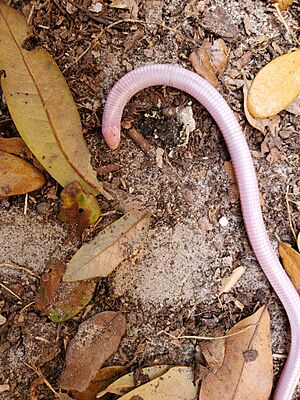Rhineura floridana facts for kids
Quick facts for kids Rhineura floridana |
|
|---|---|
 |
|
| Conservation status | |
| Scientific classification |
|
| Kingdom: | Animalia |
| Phylum: | Chordata |
| Class: | Reptilia |
| Order: | Squamata |
| Clade: | Amphisbaenia |
| Family: | Rhineuridae |
| Genus: | Rhineura |
| Species: |
R. floridana
|
| Binomial name | |
| Rhineura floridana (Baird, 1858)
|
|
| Script error: The function "autoWithCaption" does not exist. | |
| Synonyms | |
|
|
Script error: No such module "Check for conflicting parameters".
The Florida worm lizard (scientific name: Rhineura floridana) is a unique type of lizard. It's often called the graveyard snake or thunderworm. Even though it looks like a worm or snake, it's actually a special kind of lizard called an amphisbaenian. This amazing creature is the only living member of its group, the Rhineura genus. You can mostly find it in Florida, but it has also been seen in Lanier County, Georgia. There are no different types (subspecies) of the Florida worm lizard.
Contents
What Does the Florida Worm Lizard Look Like?
The Florida worm lizard can grow to be about 18 to 30 centimeters (7 to 12 inches) long. This measurement includes its tail. Its head has a special shovel-like snout. This snout sticks out past its lower jaw, which helps it dig through the ground.
Its eyes are very small and hard to see from the outside. The lizard does not have any legs. Like other amphisbaenians, its body is covered in scales arranged in rings. This makes it look a lot like a worm.
Where Does the Florida Worm Lizard Live?
The Florida worm lizard likes to live in certain places. Its favorite natural habitats are forests and areas with shrubland (bushes).
How Does the Florida Worm Lizard Behave?
The Florida worm lizard is a great burrower. This means it spends most of its time digging and living underground. It prefers soil, sand, or leaf mold to dig in. Being underground keeps it safe from animals that might try to eat it.
It usually only comes to the surface when there's heavy rain or when the ground is being plowed. This is why it sometimes gets the nickname thunderworm. If something bothers it, the lizard will quickly go back into its burrow, often tail-first.
What Does the Florida Worm Lizard Eat?
The Florida worm lizard eats insects and earthworms. It is an opportunistic feeder, which means it will eat almost any small invertebrate it can catch.
Life Cycle: How Does the Florida Worm Lizard Reproduce?
The Florida worm lizard reproduces by laying eggs. This process is called oviparity.
Conservation Status: Is the Florida Worm Lizard Safe?
The Florida worm lizard is listed as "Least Concern" on the IUCN Red List of Threatened Species. This list helps us know which animals need protection. Species are put in the "Least Concern" group if they are found in many places, have a large population, or are not decreasing quickly. The number of Florida worm lizards seems to be stable, which is good news!
 | James Van Der Zee |
 | Alma Thomas |
 | Ellis Wilson |
 | Margaret Taylor-Burroughs |



